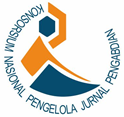Peningkatan Kualitas Asesmen Guru Bahasa Inggris SMP Melalui Pelatihan dan Pendampingan Online
Abstract
Kegiatan pengembangan profesionalisme guru menjadi kegiatan wajib bagi semua guru untuk meningkatkan pengetahuan dan keterampilan mereka secara berkala. Kegiatan yang diadakan secara daring dan berupa rangkaian kegiatan pelatihan dan pendampingan sejawat belum banyak dilaksanakan. Kegiatan pelatihan yang biasanya hanya sekali dilakukan tanpa kegiatan lanjutan hanya meningkatkan pengetahuan guru, tetapi tidak memberi mereka kesempatan untuk mengimplementasikan pengetahuan baru ini di kelas mereka masing-masing. Kegiatan pengembangan profesionalisme guru yang dilaksanakan sebagai kegiatan pengabdian kepada masyarakat selama lebih kurang satu bulan ini berpotensi untuk membantu guru merefleksi dan berkolaborasi dengan guru sejawat mereka di sekolah yang sama sehingga mereka dapat lebih percaya diri dalam mengimplementasikan pengetahuan baru mereka. Kendala teknis maupun kurangnya komitmen guru untuk mengikuti kegiatan ini secara utuh terjadi dalam program ini. Dampak nyata dari rangkaian kegiatan pelatihan dan pendampingan ini belum dapat dirasakan dalam jangka pendek, akan tetapi dengan dibukanya peluang untuk para guru membentuk komunitas belajar diantara sejawat mereka, diharapkan mereka dapat saling memberikan dukungan baik secara pengalaman maupun emosi.
Kata kunci—Pendampingan sejawat, Pengembangan profesionalisme guru, Guru Bahasa Inggris SMP
Abstract
Teacher professional development activities are mandatory activities for all teachers to improve their knowledge and skills regularly. Activities held online and in a series of training activities, and peer coaching have not been widely implemented. Training activities usually carried out only once without follow-up activities only increase teachers' knowledge but do not allow them to implement the newly acquired knowledge in their language classes. The reported teacher professional development program, carried out as a community service activity for approximately one month, can help teachers reflect on their teaching and collaborate with their peer teachers at the same school so that they can be more confident in implementing new knowledge. Technical obstacles and lack of commitment of teachers to participate in this activity as a whole occurred in this program. The real impact of this series of training and coaching activities cannot be observed in the short term, but with the opening of opportunities for teachers to form learning communities in their own school and collaborate among their peers, it is hoped that they can provide mutual support both experientially and emotionally.
Keywords— Peer coaching, Teacher professional development, Junior high school English teacher
Full Text:
PDFReferences
Avalos, B. (2011). Teacher professional development in teaching and teacher education over ten years. Teaching and Teacher Education, 27(1), 10-20.
Biggs, J., & C. Tang. (2011). Teaching for quality learning at university (4th ed.). Open University Press, Maidenhead.
Borko, H., Jacobs, J., & Koellner, K. (2010). Contemporary approaches to teacher professional development. International Encyclopedia of Education, 7, 548-556.
/Cordingley, P., M. Bell, S. Thomason, and A. Firth. 2005. The impact of collaborative continuing professional development (CPD) on Classroom teaching and learning. Review: How do collaborative and sustained CPD and Sustained but not collaborative CPD affect teaching and learning? Research evidence in education library. EPPI-Centre, Social Science Research Unit, Institute of Education, University of London, London.
Darling-Hammond, L., Wei, R. C., Andree, A., Richardson, N., & Orphanos, S. (2009). Professional learning in the learning profession. National Staff Development Council, Washington, DC.
Deeley, S. J. (2018). Using technology to facilitate effective assessment for learning and feedback in higher education, Assessment & Evaluation in Higher Education, 43(3), 439-448.
Frey, B. B. (2014). Modern classroom assessment. SAGE Publications, Ltd.
Herbert, M. (2006). Staying the course: A study in online student satisfaction and retention. Online Journal of Distance Learning Administration, 9(4), 1-14.
Heyman, E. (2010). Overcoming student retention issues in higher education online programs: A Delphi study (Doctoral dissertation).
Power, T., Shaheen, R., Solly, M., Woodward, C., & Burton, S. (2012). English in action: School based teacher development in Bangladesh. Curriculum Journal, 23(4), 503-529.
Robbins, P. (1995). Peer coaching: Quality through collaborative work. School Improvement Programs, 12, 205-28.
Stoynoff, S. (2012). Looking backward and forward at classroom-based language assessment. ELT Journal, 66, 523-532.
Tsagari, D. & Cheng, L. (2016). Washback, impact and consequences. In E. Shohamy and N. H. Hornberger (eds.), Encyclopedia of Language and Education, 3rd Edition, Volume 7: Language Testing and Assessment, pp. 359-372. Educational Linguistics: Springer.
Westbrook, J., Durrani, N., Brown, R., Orr, D., Pryor, J., Boddy, J., & Salvi, F. (2013). Pedagogy, curriculum, teaching practices and teacher education in developing countries. Education Rigorous Literature Review. DFID, London.
DOI: http://dx.doi.org/10.17977/um045v5i2p139-145
Refbacks
- There are currently no refbacks.
Email: karinov@um.ac.id

This work is licensed under a Creative Commons Attribution-ShareAlike 4.0 International License.






